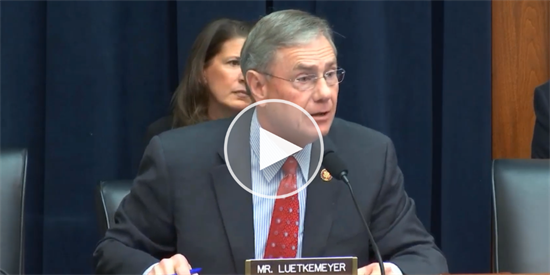Press Releases
Dimon to Luetkemeyer: CECL Will Constrain Banks at Precisely the Wrong Time
Washington,
April 10, 2019
CEOs from seven Global Systemically Important Banks (G-SIBs) testified before the House Financial Services Committee today. Congressman Blaine Luetkemeyer (MO-03), Ranking Member of the Subcommittee on Consumer Protection and Financial Institutions, asked JPMorgan Chase CEO Jamie Dimon how the Financial Accounting Standard Board’s (FASB) Current Expected Credit Loss (CECL) accounting standard could effect the economy as a whole. The entire exchange can be seen below: Congressman Luetkemeyer: Mr. Dimon, as you know, I’ve been raising alarms with regards to CECL. I believe it can have a really detrimental effect on our economy. I’ve heard from many industries—and banks in particular—insurance companies, credit card companies, the housing industry, that it will suffer because of an ill-advised accounting standard that it is. Do you have any concerns about CECL, and how do you believe it would affect the economy as a whole, in particular financial institutions? Mr. Dimon: So CECL is where a bank puts up loan losses for the full life of the loan upfront, and for JP Morgan I don’t have concerns. We’ve announced the number would be something like $6-8 billion depending on what environment we’re in. I do think you should all be looking at what it’s doing to smaller banks. I do think it would put smaller banks in a position that when a crisis hits, they will virtually have to stop lending, because putting up those reserves would be too much at precisely the wrong time. So I do think it becomes an issue for you all to reconsider. Congressman Luetkemeyer: One of the concerns I have is I don’t think that FASB has actually looked at and studied the effects of this, and the [pro]cyclicality of this, such that they didn’t look at market-to-market – look what happened there when we made a downturn, it exacerbated the situation. I think the same thing could happen with CECL. Do you agree with that? Mr. Dimon: I think CECL will constrain banks at precisely the wrong time, yes. ### |

